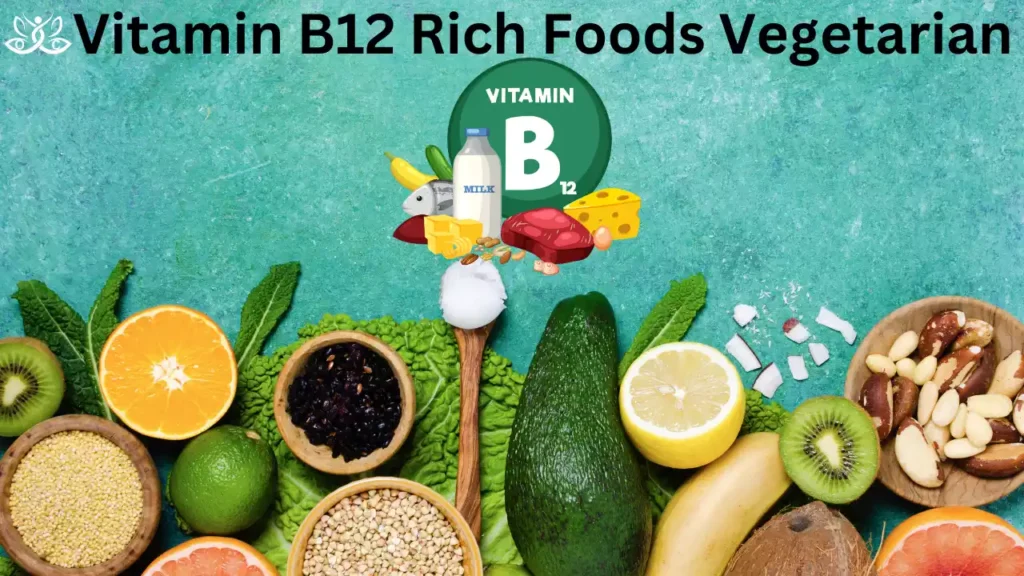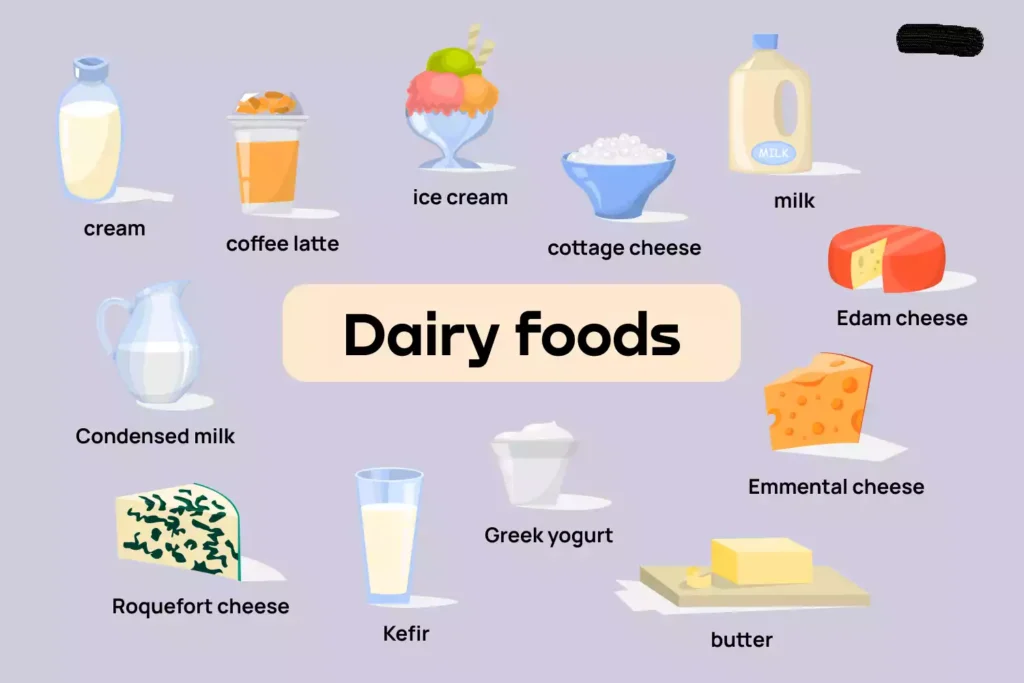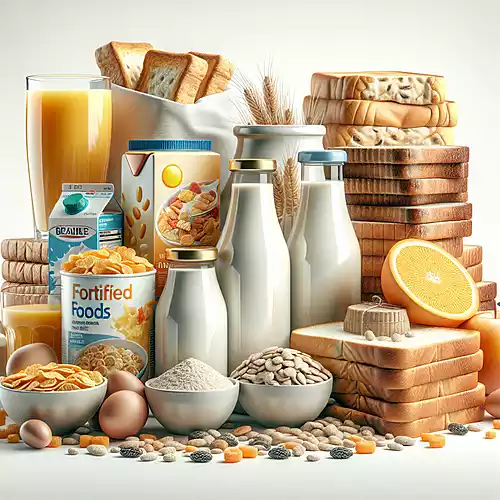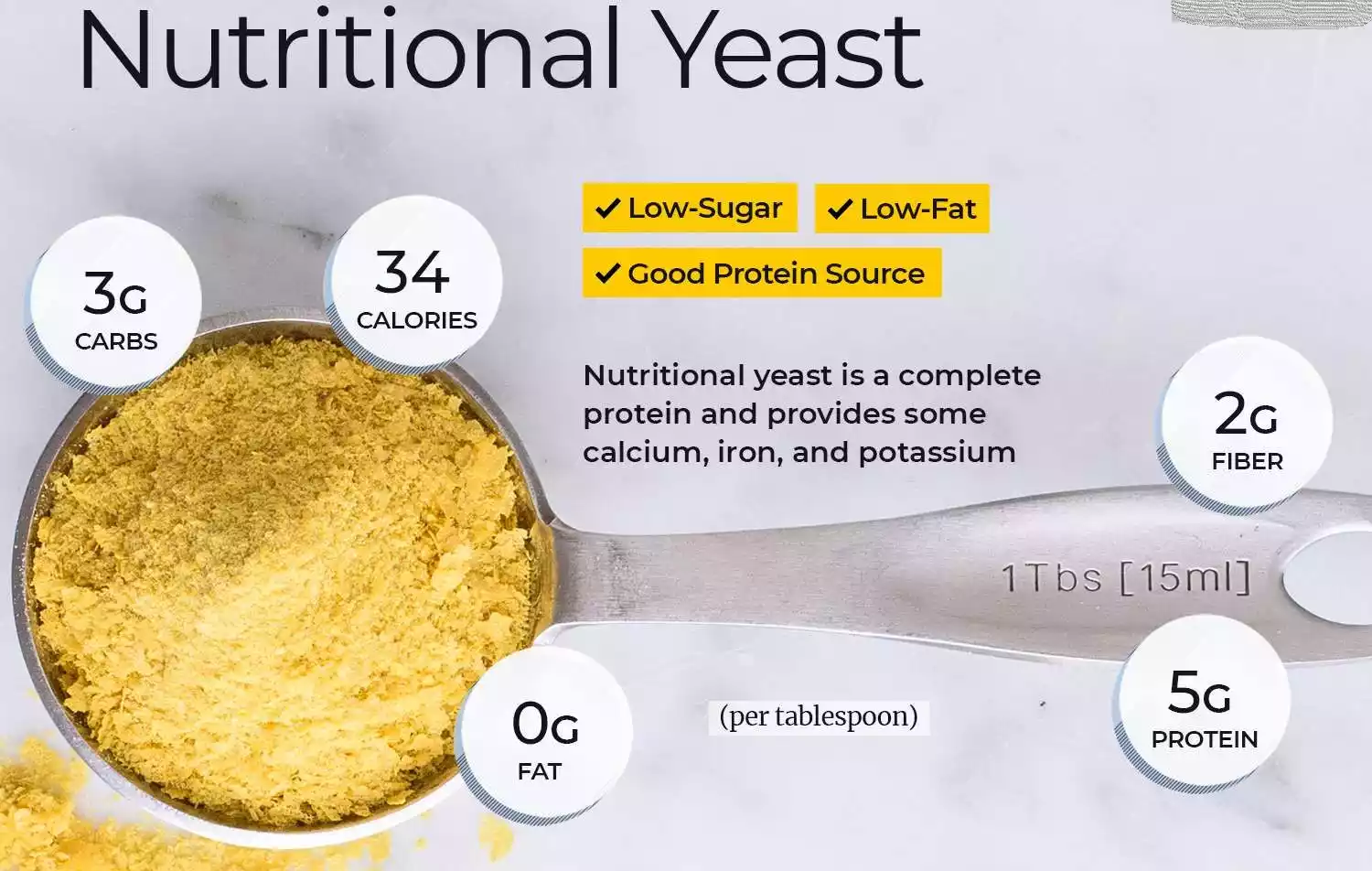Vegetarians looking to optimize their vitamin B12 intake can enjoy a delicious and nutritious diet. Dairy products, eggs, and fortified foods like cereals and plant-based milks are all excellent sources. In this article “Vitamin B12 Rich Foods Vegetarian”, will explore potential options like nutritional yeast (choose fortified varieties) and keep an eye on research developments regarding tempeh, seaweed, and algae. With a bit of planning and a variety of B12-rich choices, vegetarians can ensure they meet their daily needs for this essential vitamin.

Vitamin B12 Rich Foods Vegetarian: Ditch the Meat, Not the Energy
Vitamin B12, also known as cobalamin, is a crucial nutrient that plays a vital role in several bodily functions, including nerve function, red blood cell production, and DNA synthesis. While often associated with meat consumption, vegetarians can obtain sufficient amounts of B12 through a balanced diet that incorporates various sources.
Why is Vitamin B12 Important for Vegetarians?
Here’s a more detailed explanation of why vitamin B12 is important for vegetarians and why they have a higher risk of deficiency:
Vitamin B12 and the Body:
Vitamin B12 is like a multi-tasking assistant in your body. It’s involved in several crucial processes, including:
- Healthy Red Blood Cells: B12 helps your body produce red blood cells, which carry oxygen throughout your body. A deficiency can lead to anemia, making you feel tired and weak.
- Proper Nerve Function: B12 plays a vital role in maintaining healthy nerves. Deficiency can cause tingling, numbness, and even nerve damage.
- DNA Synthesis: B12 is needed for the production and repair of DNA, the genetic blueprint for your cells.
The Vegetarian Challenge:
Where Does B12 Come From?
- Vitamin B12 is naturally produced by bacteria. Animals like cows and chickens consume these bacteria or B12-containing foods (plants grown in B12-rich soil) and store B12 in their muscles and organs. When we eat these animal products, we absorb the B12 they contain.
Limited Vegetarian Sources:
- Unfortunately, most plants don’t contain usable amounts of B12. While some fermented plant-based foods like tempeh may have small traces, the B12 content is unreliable and not well-absorbed by the body. This leaves vegetarians with fewer natural dietary sources compared to meat-eaters.
Increased Deficiency Risk:
- Due to the limited natural sources available, vegetarians are more likely to develop a vitamin B12 deficiency if they don’t take steps to ensure adequate intake. This deficiency can take years to develop, and symptoms can be subtle at first. However, if left untreated, it can lead to serious health problems.
Key Takeaways:
- B12 is essential for healthy red blood cells, nerve function, and DNA synthesis.
- Vegetarians have fewer natural dietary sources of B12 compared to meat-eaters.
- This limited intake puts vegetarians at a higher risk of developing a vitamin B12 deficiency.
By incorporating B12-rich dairy, eggs, fortified foods, and potentially some plant-based options into their diet, vegetarians can maintain optimal B12 levels and enjoy the health benefits this vital vitamin provides.
Symptoms of Vitamin B12 Deficiency
Here’s a breakdown of the early symptoms of vitamin B12 deficiency, explaining how they might occur:
Fatigue and Weakness:
- Vitamin B12 is needed for red blood cell production. When B12 is low, your body can’t make enough healthy red blood cells, leading to anemia. This lack of oxygen-carrying red blood cells can cause you to feel tired and weak easily.
Difficulty Concentrating:
- B12 plays a role in nerve function and brain health. Deficiency can affect your memory, focus, and ability to concentrate. You might feel foggy or forget things more often.
Numbness or Tingling in Hands and Feet:
- B12 is crucial for maintaining healthy nerves. When B12 levels are low, the nerves can become damaged, causing a pins-and-needles sensation or numbness in your hands and feet.
Loss of Appetite:
- B12 can influence your digestive system. Deficiency can sometimes lead to a decreased appetite or feeling full sooner than usual.
Weight Loss:
- In some cases, vitamin B12 deficiency can cause a loss of appetite and affect how your body absorbs nutrients from food. This can lead to unintentional weight loss.
It’s important to note that these symptoms can also be caused by other health conditions. If you’re experiencing any of these issues, it’s crucial to see your doctor for proper diagnosis and treatment. They can check your B12 levels and recommend the best course of action, which may include dietary changes or vitamin B12 supplements.
Remember, early detection and treatment of B12 deficiency are essential to prevent further complications and ensure optimal health.
Top Vegetarian Sources of Vitamin B12
Here’s a breakdown of the top vegetarian sources of Vitamin B12 with a clearer explanation:
1. Dairy Products:

Good for Lacto-Ovo Vegetarians:
- This category includes vegetarians who consume dairy products like milk, yogurt, and cheese. These are excellent sources of B12 because cows naturally get B12 from gut bacteria and through their diet. The B12 gets stored in their milk and meat, which we then consume.
Highlighting B12 Content: For example, one cup of plain yogurt can provide nearly 30% of your daily B12 needs. This makes dairy a convenient and significant source for lacto-ovo vegetarians.
2. Eggs:

Another Option for Lacto-Ovo Vegetarians:
- Eggs are another good source of B12 for those who consume them. Similar to dairy cows, chickens obtain B12 through their diet and gut bacteria. This B12 gets concentrated in the egg yolk, making it a valuable source for vegetarians.
Quantifying B12 Content: A single large egg offers around 25% of the recommended daily value (DV) of B12. This means including eggs in your diet can significantly contribute to your daily B12 needs.
3. Fortified Foods:

Suitable for All Vegetarians:
- Unlike dairy and eggs, fortified foods are a great option for all vegetarians, including lacto-ovo vegetarians, lacto vegetarians (consume dairy only), and ovo vegetarians (consume eggs only), as well as vegans.
What is Fortification?
- Food manufacturers add vitamin B12 to certain products like breakfast cereals, plant-based milks, and nutritional yeasts. This makes these foods a reliable source of B12 for vegetarians who may not consume enough dairy or eggs.
Choosing the Right Fortified Foods:
- Be sure to check the label for “fortified with vitamin B12” and choose products that provide at least 25% of the Daily Value (DV) per serving. This ensures you get a significant amount of B12 from these fortified options.
By incorporating these top vegetarian sources – dairy for lacto-ovo vegetarians, eggs for those who consume them, and fortified foods for all vegetarians – you can significantly increase your B12 intake and reduce the risk of deficiency.
Other Potential Sources of Vitamin B12
Here’s a breakdown of other potential vegetarian sources of vitamin B12:
1. Nutritional Yeast:

Popular Vegan Option:
- Nutritional yeast is a deactivated yeast product with a cheesy or nutty flavor, making it popular among vegans for adding umami taste to dishes.
Debated Bioavailability:
- While some studies suggest nutritional yeast contains B12, the type of B12 present may not be easily absorbed by the body (low bioavailability). This means even if it contains B12, your body might not get the full benefit.
Recommendation:
- Look for fortified nutritional yeast. Manufacturers add reliable forms of B12 to these varieties, making them a more dependable source.
2. Tempeh:

Fermented Soy Product:
- Tempeh is a fermented soybean cake with a slightly nutty flavor. During fermentation, some bacteria might produce small amounts of B12.
Uncertain B12 Content:
- The exact amount and type of B12 in tempeh are still unclear. More research is needed to confirm its B12 content and how well our bodies can absorb it.
Consider as a Bonus:
- While more research is needed, you can include tempeh in your diet, but don’t solely rely on it to meet your B12 needs.
3. Seaweed and Algae:

Promising Option:
- Certain seaweeds like nori (used in sushi) and algae like spirulina show potential as B12 sources.
Further Research Needed:
- More studies are required to determine the specific type of B12 present in these seaweeds and algae and how well it’s absorbed by the body.
Consider Future Potential:
- While research is ongoing, seaweed and algae might become reliable B12 sources in the future.
Key Takeaway:
- These potential sources (nutritional yeast, tempeh, seaweed, algae) require further research to definitively determine their B12 content and bioavailability. It’s best to rely on established sources like dairy, eggs, and fortified foods for vegetarians until more is known about these options.
Maintaining Optimal Vitamin B12 Levels as a Vegetarian
Here’s a breakdown of how to maintain optimal B12 levels as a vegetarian:
1. Embrace Variety:
Multiple B12 Sources:
- Don’t rely on just one source of B12. Include a variety of B12-rich foods in your diet. This spreads out your B12 intake and helps ensure you get enough throughout the day.
Examples:
- If you’re a lacto-ovo vegetarian, incorporate yogurt, milk, cheese, and eggs. Vegans can focus on fortified foods like cereals and plant-based milks, along with exploring potential sources like nutritional yeast (look for fortified varieties).
2. Make Fortification Your Friend:
Reliable B12 Boost:
- Many breakfast cereals and plant-based milks are fortified with vitamin B12. This is a convenient and reliable way to increase your B12 intake, especially if you don’t consume enough dairy or eggs.
Check the Label:
- Look for “fortified with vitamin B12” on food labels. Choose products that provide at least 25% of the Daily Value (DV) of B12 per serving. This ensures you get a significant amount of B12 from these fortified options.
3. Partner with Your Doctor:
B12 Level Check:
- If you’re concerned about B12 deficiency, talking to your doctor is crucial. They can order a simple blood test to check your B12 levels.
Personalized Guidance:
- Based on your test results and individual needs, your doctor can recommend the best course of action. This might involve dietary adjustments to include more B12-rich foods or taking vitamin B12 supplements.
By following these tips, you can take charge of your B12 health as a vegetarian. By incorporating a variety of B12 sources, regularly consuming fortified foods, and consulting with your doctor, you can ensure optimal B12 levels and enjoy the many benefits this essential vitamin provides.
Sample Vegetarian Diet Chart Rich in Vitamin B12
| Meal | Food Option | Approx. Vitamin B12 Content | Notes |
| Breakfast | 1 cup fortified plant-based milk with cereal (25% DV B12) + 2 scrambled eggs | 2.0 mcg (8% DV) + 2.5 mcg (10% DV) | Choose cereal with at least 25% DV B12 per serving. |
| Mid-Morning Snack | 1 cup Greek yogurt with berries | 1.1 mcg (5% DV) | Choose plain yogurt and add your own fruit for sweetness. |
| Lunch | Chickpea salad sandwich on whole-wheat bread + side salad | Trace amounts | Chickpeas may contain some B12, but not a reliable source. Focus on other B12 sources throughout the day. |
| Afternoon Snack | 1/4 cup fortified nutritional yeast sprinkled on popcorn | Varies depending on brand | Look for fortified nutritional yeast varieties for a reliable B12 source. |
| Dinner | Veggie burger with 1 cup fortified plant-based cheese + side of roasted vegetables | Trace amounts (burger) + 1.0 mcg (4% DV) (cheese) | Choose veggie burgers with added B12 and fortified plant-based cheese. |
| Evening Snack | Cottage cheese with chopped vegetables | 0.4 mcg (2% DV) | Cottage cheese is a good source of B12 for vegetarians who consume dairy. |
Additional Tips:
- Include a variety of B12-rich foods throughout the day.
- Consider taking a vitamin B12 supplement if you’re concerned about meeting your daily needs. Talk to your doctor for guidance.
- Regularly check food labels to see if products are fortified with vitamin B12.
- Remember, this is just a sample. Feel free to adjust portion sizes and explore other B12-rich vegetarian options like tempeh (research B12 content) or fortified tofu scrambles.
mcg – Micrograms (unit of measurement for vitamin B12)
DV – Daily Value
Remember, this is just a starting point. Consulting a registered dietitian can help you create a personalized vegetarian meal plan that meets your specific B12 needs and preferences.
Supplements for Vegetarians
- In addition to dietary sources, vegetarians may benefit from taking Vitamin B12 supplements to meet their daily requirements. When choosing a supplement, opt for methylcobalamin or cyanocobalamin forms, as they are better absorbed by the body. It’s essential to consult with a healthcare professional to determine the appropriate dosage for your individual needs.
Tips for Maximizing Vitamin B12 Absorption
To maximize the absorption of Vitamin B12 from your diet, consider the following tips:
- Pair with Vitamin C: Consuming Vitamin C-rich foods alongside Vitamin B12 can enhance absorption. Try adding citrus fruits, bell peppers, or strawberries to your meals.
- Limit Alcohol Consumption: Excessive alcohol consumption can interfere with Vitamin B12 absorption. Be mindful of your alcohol intake to ensure optimal nutrient absorption.
Common Misconceptions About Vitamin B12
Myth: Only meat eaters need to worry about B12
While animal-based foods are rich sources of Vitamin B12, vegetarians can also be at risk of deficiency if they don’t consume enough fortified foods or supplements. It’s essential for vegetarians to pay attention to their B12 intake to maintain optimal health.
Myth: All plant-based foods contain B12
While some plant-based foods may contain trace amounts of Vitamin B12, they are not reliable sources for meeting daily requirements. Vegetarians should focus on incorporating fortified foods and supplements into their diets to ensure adequate B12 intake.
Conclusion
Maintaining optimal vitamin B12 levels is crucial for overall health, and vegetarians can achieve this through a well-planned diet. While meat naturally contains B12, vegetarians have a variety of options to meet their needs.
Key Takeaways:
- Lacto-ovo vegetarians can incorporate dairy products and eggs, both excellent sources of B12.
- All vegetarians can benefit from fortified foods like breakfast cereals and plant-based milks.
- Some potential sources like nutritional yeast, tempeh, seaweed, and algae require further research for definitive B12 content and bioavailability.
- Regularly consuming a variety of B12-rich foods and fortified options is key.
- Consulting your doctor for B12 level checks and potential supplementation ensures you’re getting enough of this vital nutrient.
By embracing a balanced and B12-conscious vegetarian diet, you can ensure your body thrives and you reap the full benefits of this healthy lifestyle choice.
FAQs
Q. Can’t I get enough Vitamin B12 from plant-based sources alone?
A. While some plant-based foods contain Vitamin B12, they are not reliable sources for meeting daily requirements, especially for vegetarians. Incorporating fortified foods and supplements is essential for ensuring adequate intake.
Q. How do I know if I need to take a Vitamin B12 supplement?
A. If you follow a vegetarian diet or have limited intake of Vitamin B12-rich foods, consider consulting with a healthcare professional to determine if supplementation is necessary based on your individual needs and blood test results.
Q. Are there any side effects of taking Vitamin B12 supplements?
A. Vitamin B12 supplements are generally considered safe when taken as directed. However, in some cases, high doses may cause minor side effects such as nausea or diarrhea. It’s essential to follow dosage recommendations provided by healthcare professionals.
Q. Can Vitamin B12 deficiency be reversed with dietary changes alone?
A. In mild cases of deficiency, increasing intake of Vitamin B12-rich foods or fortified foods may help reverse symptoms. However, severe deficiencies may require supplementation under the guidance of a healthcare professional.
Q. How often should I get my Vitamin B12 levels tested?
A. It’s recommended to have your Vitamin B12 levels tested regularly, especially if you follow a vegetarian diet or have symptoms of deficiency. Healthcare professionals can advise on the appropriate frequency based on your individual health status.
of course like your website but you have to check the spelling on several of your posts A number of them are rife with spelling issues and I in finding it very troublesome to inform the reality on the other hand I will certainly come back again
What i dont understood is in reality how youre now not really a lot more smartlyfavored than you might be now Youre very intelligent You understand therefore significantly in terms of this topic produced me personally believe it from a lot of numerous angles Its like women and men are not interested except it is one thing to accomplish with Woman gaga Your own stuffs outstanding Always care for it up